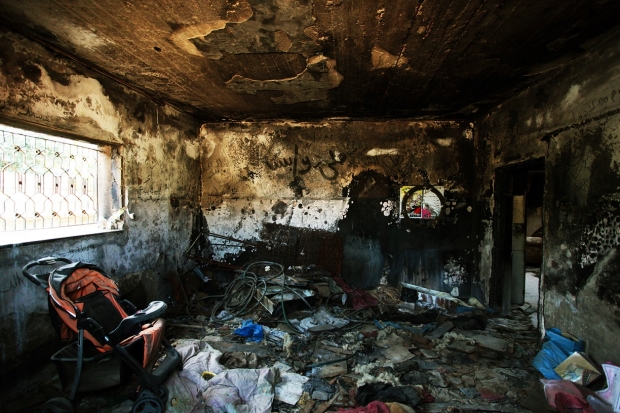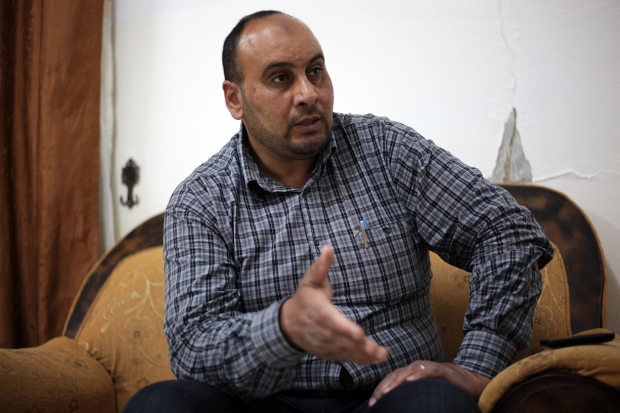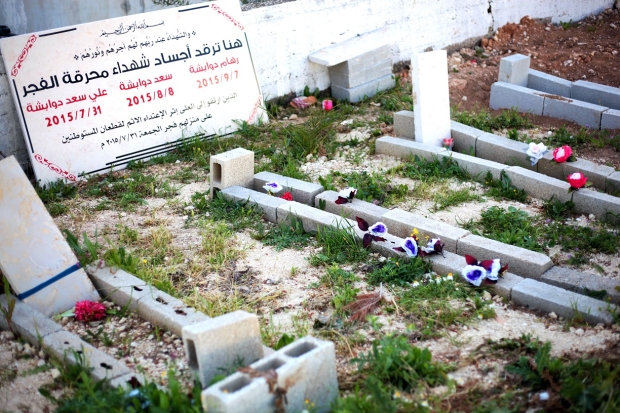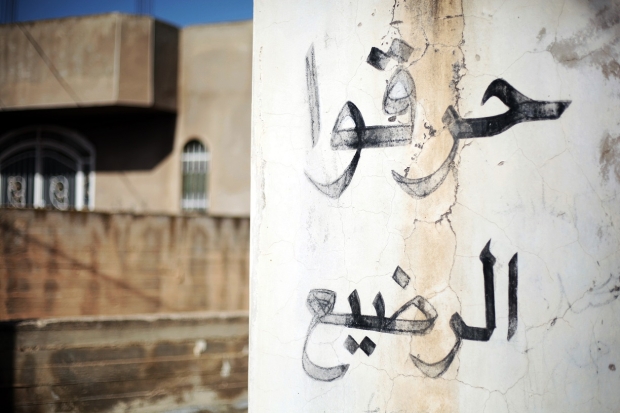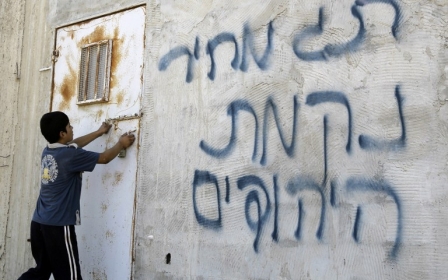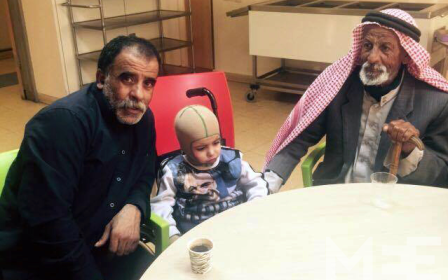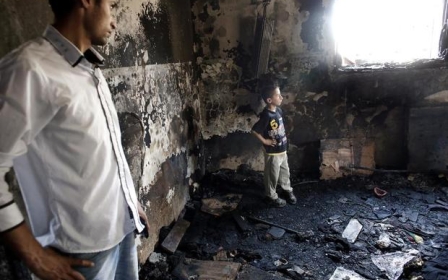Palestine's arson victims wait for justice: 'He just wants to go to heaven'
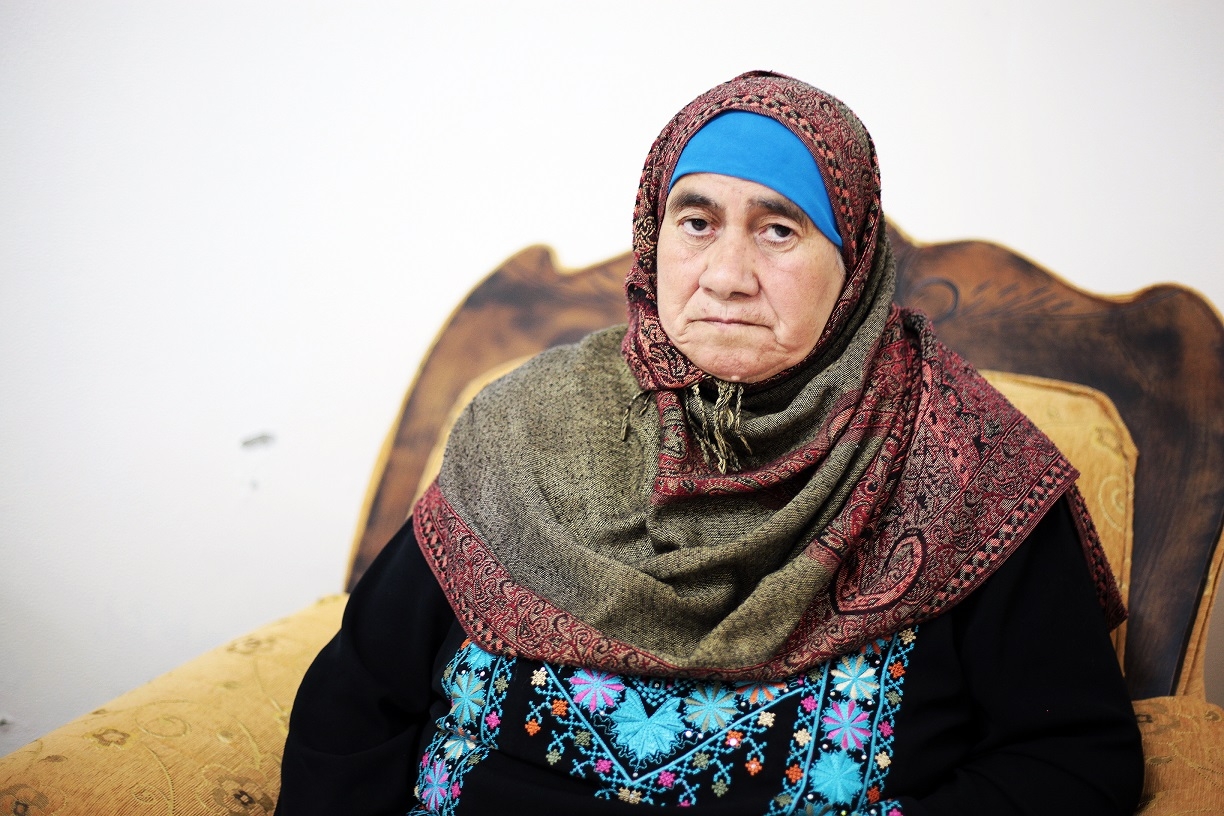
DUMA, West Bank - No one expected Duma to be attacked. It is a quiet place of around 3,500 people, south-east of the West Bank city of Nablus. Concrete houses stand stiff between small patches of wheat and orange trees. Over the morning breeze floats an orchestra of bleating goats, mooing cows and tooting cockerels.
But this place holds terrible memories. On 31 July 2015, the village home of Sa’ad and Riham Dawabsheh was set ablaze in an arson attack. The couple, along with their 18-month-old son Ali, were killed. Four-year-old Ahmad Dawabsheh was the sole survivor.
'It was hard to find Ali until my leg hit something soft. It was him. He was fully burned. A third of his body was no longer there'
- Nasser Dawabsheh
The night of the fire is burnt into the wider family’s collective memory. In interviews in Duma, Sa’ad and Riham’s closest surviving relatives recalled the attack and spoke of how they are trying to move on with their lives.
The uncle and brother Nasser Dawabsheh, 43, a science teacher, remembers hearing the fire from his house, just 100 metres away from his brother Sa'ad’s burning home. He helped move his relatives outside and was the first to feel Ali’s dead body.
“It took two fire engines to put the fire out,” he recounts in his mother’s bright white reception room, entered through a traditional Palestinian green wrought iron door. “We went into the house with the civil defence force. It was hard to find Ali until my leg hit something soft. It was him. He was fully burned. A third of his body was no longer there. That was horrible.”
“My brother Sa’ad was a good man. He was seeking to build his future with his wife, and to provide a good future to his children, and to build a new house for his family. I have only two brothers. It was hard for me to lose one of them.”
The orphaned child
Ahmad Dawabsheh, now seven years old, was the only member of the household who survived the attack. He spent the next year in hospital, having suffered second-and third-degree burns to at least 60 percent of his body. He still has widespread physical scarring as a result, although the psychological wounds run much deeper. He now lives with his maternal grandmother in Duma.
'I have only two brothers, it was hard for me to lose one of them'
- Nasser Dawabsheh
Still, there is strength and some reason to be happy.
Ahmad finished his first year of school with top marks. “We are taking the chance to celebrate with Ahmad,” explains Nasser. “It was supposed to be his parents being happy for him, but we want to compensate him, because he lost them. We will fill this void that he has, as we can.”
The mother and grandmother
Rehab Zaid Dawabsheh, 67, Ali and Ahmad's paternal grandmother, lost her husband just days before MEE interviewed her at home in Duma. He has been buried next to Sa’ad, Riham, and Ali.
She has not been to the shell of her son’s former home for six months. “I cannot face the view. I see my son there.”
She finds forgiveness difficult.
She starts to weep. Then she speaks, and it is as if she has suddenly begun to feel everything again.
'He does not dream of becoming a doctor or a teacher, etc. He just wants to go to heaven [to meet his parents]'
- Nasser Dawabsheh
“I am a mother, my husband was sick,” she cries. “I forgot my sadness to care for him. Why are they free until now, despite how they killed a family?”
The Dawabsheh family does not yet feel that there has been justice for the violence and loss they have suffered.
In January 2016, a court charged Israeli Amiram Ben Oliel with three counts of murder, two counts of attempted murder, two counts of arson, and one count of conspiring to commit a nationalistically motivated crime over the Dawabshehs’ death. A minor, who cannot be named under Israeli law, has been charged with conspiring to commit a crime of murder. The two defendants have been held in custody since their arrest and their trial is still ongoing.
A spokesperson from the Israeli Ministry of Justice said they had no estimate regarding the outcome of the ongoing trial.
The aunt and sister
In Duma, the cicadas start to hum as the sky blackens. Abla Dawabsheh, 42, Sa’ad’s sister and aunt of Ali and Ahmad, enters the room. She is carrying a plate stacked high with juicy dates.
'[Those responsible] do not have a heart, or mercy. Animals could not do what they did.'
- Abla Dawabsheh
She explains how they initially thought the fire had been sparked by gas or electricity.
“We cannot imagine that a human could do this,” she says, her voice frustrated and deeply sad at the same time.
“They [those responsible] do not have a heart, or mercy. Animals could not do what they did.”
The village
The Dawabsheh family, one of the largest clans in Duma, have plans to memorialise Sa’ad, Riham and Ali. The burnt-out shell of the house is to remain as it stands. Funds permitting, it will become a museum, even if it becomes another target for Israeli surveillance or settler violence.
“Up until now we have not received any funds from the Palestinian authorities,” he says. “We will organise a campaign to collect donations for it. The museum will show the world the crimes of the Israelis and their violence.”
'We were born here, and we will die here. We will not be refugees'
- Nasser Dawabsheh
The village was shaken by the attack on the Dawabshehs, but settler violence continued afterwards. Villagers feel that Israeli soldiers have been complicit.
“Eight or nine months after the attack, after the arrest of the accused persons, settlers entered the village and attacked us. The Israeli army protected them,” says Nasser.
The Dawabshehs still feel the intimidating presence of Israeli settlements around them. The communities of Israeli immigrants, which number around 130 in the West Bank, are considered illegal under international law.
But Nasser refuses to leave Duma. Ahmad still attends the local school, which has been renamed after his tiny dead brother: the Ali Dawabsheh school.
“If I travelled, that would mean that they [settlers] had achieved their goal,” explains Nasser. “I will live here with my children. We had [a] chance to live in Nablus, but we do not want to. We will not leave.”
The West Bank
The two-year anniversary of Sa’ad, Riham and Ali’s deaths comes as Israel starts work on its first official settlement in 20 years - just kilometres away from Duma.
Ben Oliel came from one of around 100 outposts - informal settler communities that even Israeli authorities consider illegal - that is also just a few hillsides away.
'Terrorism is terrorism, regardless of colour, religion, and beliefs'
- Nasser Dawabsheh
“They have started surrounding us. They try to isolate the village and to control large spaces in the village and to keep us in a small area,” Nasser admits. But he is defiant, too.
“We must not allow them to achieve their settlement project. We were born here, and we will die here. We will not be refugees. We are in our land and despite all their pressure, we will stay in it.
“We reject what happened to us happening to another family, even if it is a Jewish family. Terrorism is terrorism, regardless of colour, religion, and beliefs.”
New MEE newsletter: Jerusalem Dispatch
Sign up to get the latest insights and analysis on Israel-Palestine, alongside Turkey Unpacked and other MEE newsletters
Middle East Eye delivers independent and unrivalled coverage and analysis of the Middle East, North Africa and beyond. To learn more about republishing this content and the associated fees, please fill out this form. More about MEE can be found here.


